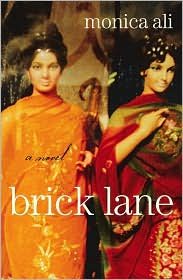Our book group for September 2003 is Brick Lane by Monica Ali. With great poignancy, It is a novel by Monica Ali that tells the story of Nazneen, a young Bangladeshi woman who is forced to marry a much older man and move to London. The novel explores themes of culture clash, identity, and the search for belonging.
Nazneen is born in a small village in Bangladesh in 1971. She is a bright and curious child, but her life is limited by the strictures of her culture. When she is 16 years old, she is married to Chanu, a 40-year-old man who lives in London. Nazneen is reluctant to leave her home and family, but she knows that she has no choice.
Nazneen and Chanu move to a small apartment in Brick Lane, a predominantly Bangladeshi neighborhood in London. Nazneen is initially overwhelmed by her new life. She does not speak English, and she is homesick for her family and friends. She also struggles to adjust to Chanu’s controlling and demanding behavior.
Over time, Nazneen begins to adapt to her new life. She learns English, makes friends, and starts to work in a garment factory. She also begins to question her arranged marriage and her traditional Muslim beliefs.
One day, Nazneen meets Karim, a young Bangladeshi man who is also living in Brick Lane. Karim is kind and understanding, and he helps Nazneen to see the world in a new way. Nazneen begins to fall in love with Karim, but she knows that their relationship is forbidden.
Nazneen’s story is one of hope and resilience. Despite the challenges she faces, she never gives up on her dreams. She eventually finds her own voice and her own identity, and she learns to live her life on her own terms.
Discussion Questions
- In the beginning of Monica Ali’s novel, Brick Lane, we follow the protagonist Nazneen from her rural Bangladeshi village to London where she has gone from teenager to married woman. How does Nazneen cope with the transition? In what small ways does she rebel against her fate?
- Chapter 2 presents Dr. Azad, the enigmatic doctor who becomes Chanu’s unlikely friend. Nazneen is often bewildered by their friendship; what is the tie that binds this odd couple?
- When Nazneen sees the ice skaters on television, she is immediately captivated. This image is recalled several times throughout the novel, at the end of the book Nazneen is at an ice-skating rink, about to skim the ice for the first time. What does the ice skating symbolize?
- Nazneen’s friend, Razia, thinks marrying for love is romantic but when it comes to her own daughter she says, “Shefali will make a love marriage over my dead body.” Why do you think arranged marriages are valued above love marriages? Discuss the advantages of both using examples from the book?
- Fate is a significant theme in the novel. What role does Fate play in Nazneen’s life? Discuss the ideological struggle between Fate and self-determination.
- In Chapter Three, Mrs. Islam tells a story about female empowerment. She says, “If you think you are powerless, then you are.” How has Mrs. Islam’s choosen to live her life? Is she powerful? Empowered? Describe Nazneen’s process of self-empowerment? How does faith relate to female empowerment?
- Shahana wears jeans and has a certain independence that Nazneen cannot help but admire. In Chapter 6 Nazneen tries on a pair of Chanu’s pants, and asks herself, “where’s the harm?” Discuss Nazneen’s relationship with Shahana? Do you think Nazneen lives vicariously through her outspoken daughter? Why does Nazneen allow Shahana to kick her?
- As a Muslim woman, relatively confined to her household quarters, Nazneen has limited contact with men. What is the nature of her relationship with her husband Chanu? With Karim?
- Considering Nazneen and Karim’s faith, how do you account for their relationship? How do you explain their attraction to each other? What compels them to continue their dangerous liaisons? Why do you think Nazneen decides to end it?
- Discuss the culture clash between the Bangladeshi’s and the English, Muslims and Christians, men and women and between the generations.
- Chanu is a curious character of high-hopes and endless projects that inevitably fizzle. In spite of his education and ambition, why is Chanu unable to rise above his struggling status? Is the racist system of England set against him? Or is he merely more a man of talk rather than action?
- Razia, a queen of gossip, knows all the intimate details of the community dwellers. Why is she unable to see the signs of drug usage with her son Tariq? Why doesn’t Nazneen tell her friend what she suspects?
- How do you think life would have been for the family had Nazneen decided to return to Bangladesh with Chanu? Do you think Chanu will eventually return to London?

